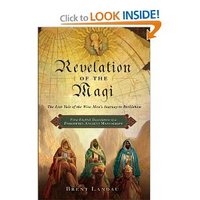 I was invited to participate in Patheos’ Book Club, where we read Brent Landau’s Revelation
I was invited to participate in Patheos’ Book Club, where we read Brent Landau’s Revelation
of the Magi, a translation of an ancient Syriac document that recounts the
legend of the magi who visit the baby Jesus. I finished the book with two thoughts.
One, I was more interested in Landau’s scholarship about the story than I was
in reading the story itself. Landau’s Introduction and Conclusion place the
text in its historical, literary, and theological context, and I appreciated
the thoroughness and accessibility of his explanations. Very few modern
scholars have noticed this ancient tale until Landau took it upon himself to
translate it from the Syriac. He does a good job explaining how it was
influential for centuries before it fell out of use within the Christian
community.
The story itself begins with the origin of the magi, tracing
their lineage back to Adam. It describes the star of Bethlehem as visible only
to those who have eyes to see. In some ways, it is akin to a modern day gloss
on the Christmas story–taking a kernel of Luke or Matthew’s account and
imagining before and after and behind-the-scenes. I prefer the canonical
Gospels as my source for the story of Jesus’ birth, but the imaginative work of
later followers of Jesus certainly can enhance our own theological reflections
upon the meaning of this story. If Imogene from The Best Christmas Pageant Ever and Charlie Brown can help unfold
the “true meaning” of Christmas, so can this tale.
According to Landau, one of the most distinctive features of The Revelation of the Magi is the fact that Jesus is never named Christ (except in a postscript involving St. Thomas, which Landau concludes was added centuries after the original text, perhaps to correct what was seen as dangerous theology). In Landau’s interpretation, “According to the author of the Revelation of the Magi, the fundamental Christian message is not simply that Christ has been sent to save all humanity… The Revelation of the Magi goes much further than this, claiming that the revelation of Christ is actually the foundation of all humanity’s religious beliefs and practices.” Furthermore, Landau explains, “The Revelation of the Magi apparently believes that having an experience of Christ’s presence is much more important than being a Christian.”
The Revelation of the Magi may well be an early Christian text that supports the idea of universal salvation through Christ. If so, it resonates with some contemporary Christian theology. But this idea isn’t as revolutionary as it may seem, and whenever we connect ancient texts to modern ideas we run the risk of accidentally imposing modern ideas upon those texts.
But let’s assume that Landau is correct, and The Revelation of the Magi is a document that downplays the need to become a Christian in order to be saved. Most contemporary people would still find its theology offensive. It still asserts that salvation is necessary for all people, and salvation is possible only through Christ, even if the ones being saved don’t put it in those terms. Perhaps this text comes closer to religious pluralism than canonical Scripture, but, like the proclamations from within the Gospels about Jesus, it is only through Christ that anyone can be saved. Christians believe this salvation is good news, even as it is news that offends modern sensibilities about tolerance and respect for other religions. In fact, I’m not sure whether it is more offensive to believe that everyone needs to become a Christian to be saved or to believe that people experience Christ’s presence and gain salvation without knowing it.
According to Landau, The Revelation of the Magi demonstrates the fact that human beings have wondered about the universality of Christ’s salvation since the days of his birth. Whether or not modern readers agree with his theological interpretation, Brent Landau has given us access to one more story that offers insight into the meaning of Christmas.
I was also given a chance to ask Dr. Landau a few questions about the text. My questions are as follows:
Dr. Landau mentions the contemporary theological implications of this ancient text, and he mentions the influence of the text on art and, to a lesser degree, the conquistadors. I’m wondering if there is any sense of why this legend fell out of use, if it “lived” for a thousand years, and I’m wondering what it’s theological value was during those years of use.
Secondly, what does the role of silence– in the naming of the magi and the emphasis on silent prayer– tell us about the origins of this document and / or the theology within? I’m curious especially if there is any connection to the eastern orthodox tradition.
Click here to read his thorough and helpful responses.

